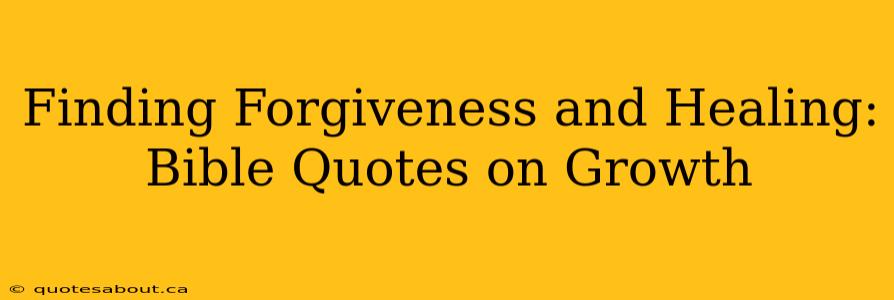Forgiveness. It's a word that resonates with both profound power and immense difficulty. Holding onto resentment and anger eats away at our souls, hindering our growth and well-being. The Bible, a rich tapestry of wisdom and guidance, offers a wealth of verses that illuminate the path towards forgiveness, healing, and spiritual growth. This exploration delves into key biblical quotes, unpacking their meaning and offering practical applications for fostering personal transformation.
What Does the Bible Say About Letting Go of Anger?
The Bible doesn't shy away from the destructive nature of anger. Proverbs 14:29 states, "A person's wrath brings about conflict, but his patience brings about reconciliation." This verse clearly highlights the choice we have: harbor anger and fuel conflict, or cultivate patience and pave the way for reconciliation—both with ourselves and others. Letting go of anger isn't about condoning wrong actions; it's about releasing the burden it places on our hearts and minds, freeing ourselves to heal and grow. Ephesians 4:26 further emphasizes this point: "‘In your anger do not sin’: Do not let the sun go down while you are still angry," urging us to actively address anger before it festers and poisons our spirits.
How Can I Forgive Someone Who Hurt Me Deeply?
Forgiving someone who has deeply hurt us is arguably one of the most challenging tasks we face. It requires humility, empathy, and a willingness to let go of the desire for retribution. Matthew 6:14-15 offers profound guidance: "For if you forgive other people when they sin against you, your heavenly Father will also forgive you. But if you do not forgive others their sins, your Father will not forgive your sins." This isn't about condoning the actions of the offender; it's about recognizing our own need for forgiveness from God and extending that same grace to others. The process is often gradual, a journey rather than a single destination. Seeking solace in prayer, engaging in self-reflection, and potentially seeking professional guidance can significantly aid this journey.
Bible Verses About Healing Emotional Wounds
The Bible speaks extensively about healing, both physical and emotional. Psalm 147:3 assures us, "He heals the brokenhearted and binds up their wounds." This verse reminds us that God is actively involved in our healing process. He sees our pain, understands our struggles, and offers comfort and restoration. Isaiah 61:1 proclaims, "The Spirit of the Sovereign Lord is on me, because the Lord has anointed me to proclaim good news to the poor. He has sent me to bind up the brokenhearted, to proclaim freedom for the captives and release from darkness," showcasing God's active role in mending our emotional wounds. This healing isn't always instantaneous; it’s a process of restoration that requires faith, patience, and trust in God's plan.
How Can Forgiveness Lead to Personal Growth?
Forgiveness, paradoxically, is a gift we give ourselves as much as the other person. By releasing the grip of bitterness and resentment, we free ourselves from the emotional prison of the past. This allows us to move forward, to heal, and to grow spiritually and emotionally. Colossians 3:13 encourages us, "Bear with each other and forgive one another if any of you has a grievance against someone. Forgive as the Lord forgave you." This act of forgiveness doesn't minimize the harm caused, but it does break the cycle of negativity, allowing for reconciliation and growth. The freedom that comes from forgiveness unlocks opportunities for deeper relationships, increased compassion, and a greater sense of peace.
Does Forgiveness Mean Reconciliation?
While forgiveness is crucial, it doesn't automatically necessitate reconciliation. Forgiveness is an internal process, a release of anger and bitterness. Reconciliation, however, requires interaction and a renewed relationship. Sometimes, reconciliation isn't possible or even safe. The focus should remain on forgiving, healing, and protecting one's own well-being, even if reconciliation with the offending party is not attainable. Forgiveness, therefore, is a powerful act of self-care, paving the way for future healthy relationships and personal growth, even if those relationships don’t involve the person who caused the harm.
Finding forgiveness and healing is a journey that requires faith, patience, and self-compassion. The Bible provides a roadmap, guiding us toward a life characterized by peace, growth, and a deeper connection with God and others. By actively engaging with these principles and seeking guidance when needed, we can navigate the complexities of forgiveness and embrace the transformative power of healing.

